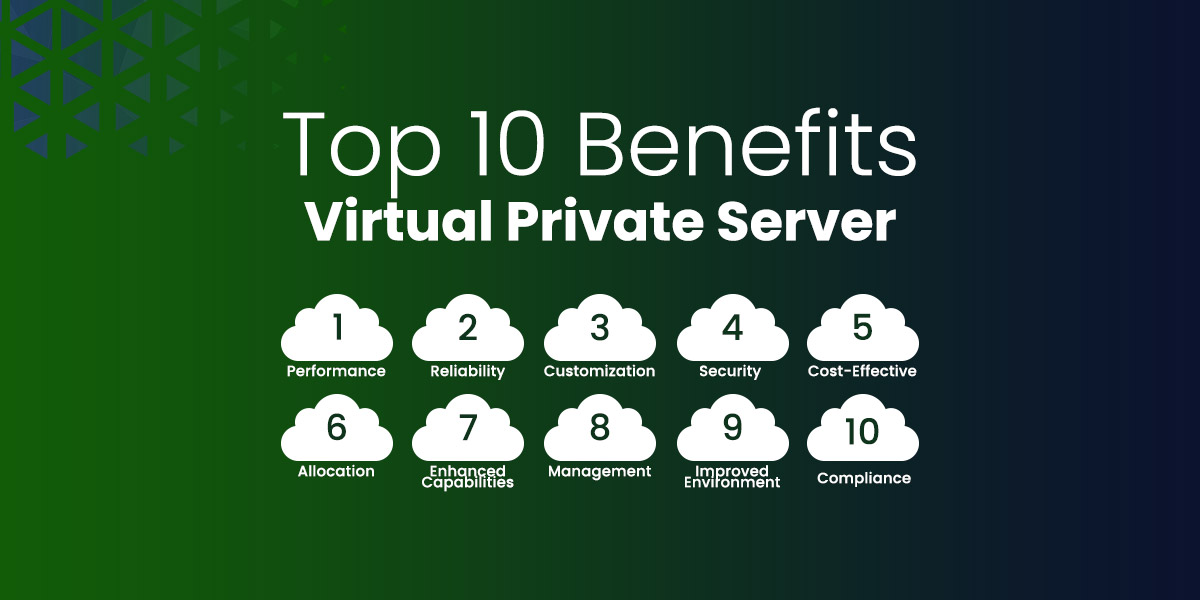In today’s fast-paced digital landscape, businesses of all sizes are constantly seeking ways to enhance their online presence, improve website performance, and ensure data security. As companies expand, the need for reliable, scalable, and cost-effective hosting solutions becomes increasingly critical. Enter the Virtual Private Server (VPS) – a powerful hosting option that bridges the gap between shared hosting and dedicated servers, offering an optimal blend of performance, control, and affordability. Unlike traditional shared hosting, where multiple websites coexist on a single server, VPS hosting provides dedicated resources within a virtual environment, ensuring faster load times, better security, and enhanced reliability. This makes VPS an ideal choice for growing businesses that require flexibility and customization without the high costs of dedicated servers. In this blog, we will explore the Top 10 Benefits of Virtual Private Server of using a Virtual Private Server, highlighting why it’s the perfect solution for expanding businesses looking to optimize their web hosting infrastructure.

1. Enhanced Performance and Speed
With VPS hosting, your website benefits from dedicated resources, ensuring faster loading times and a smooth user experience. Improved server response times enhance the overall user experience and keep visitors engaged. VPS hosting also provides scalable resources, allowing your website to handle traffic spikes efficiently without compromising performance.
2. Increased Reliability and Uptime
PS hosting offers an isolated environment, ensuring stability and reducing the risk of downtime caused by other websites. Your website is unaffected by neighboring websites, providing a more reliable hosting solution. Additionally, VPS hosting includes improved disaster recovery options, allowing you to quickly restore your website in case of any issues.
3. Greater Control and Customization
Customization is one of the important Top 10 Benefits of Virtual Private Server, VPS hosting grants you root access, enabling advanced configurations and complete control over your server environment. It allows you to choose your preferred operating system, providing flexibility to match your specific needs. Moreover, with VPS hosting, you can install custom software and applications, tailoring your server environment to your exact requirements.
4. Improved Security Measures
VPS hosting offers an isolated environment, enhancing protection and reducing the risk of security breaches. You can customize firewall and security settings, providing a higher level of security for your website. Regular security updates and patches keep your server secure and up-to-date.
5. Cost-Effective Scaling Options
VPS hosting is cost-effective, allowing you to pay only for the resources you need, making it a budget-friendly option. It offers easy upgrades, enabling you to scale your resources as your business grows without hassle. With VPS hosting, you avoid the need for expensive hardware investments, reducing overall costs and maintenance efforts.
6. Flexible Resource Allocation
VPS hosting provides adjustable CPU, RAM, and storage, allowing you to allocate resources based on your specific needs. You can handle seasonal traffic fluctuations efficiently, ensuring consistent performance. Resource reallocation optimizes performance and ensures your website runs smoothly.
7. Enhanced Email and Web Hosting Capabilities
VPS hosting improves email deliverability, ensuring your emails reach their intended recipients without issues. It supports multiple domains and websites, providing a comprehensive managed hosting solution for your business. With advanced spam filtering and email security, your communications are protected.
8. Simplified Server Management
Server managed is one of the Top 10 Benefits of Virtual Private Server which can’t be ignored. VPS hosting offers user-friendly control panels, simplifying server management and making it accessible for all users. Automated backups and restoration ensure your data is safe and easily recoverable. Easy monitoring and reporting tools allow you to keep track of your server’s performance effortlessly.
9. Improved Developer Environment
VPS hosting supports various programming languages, creating a versatile environment for developers. You can create staging environments for testing, ensuring your website is error-free before going live. Integration with version control systems streamlines development and deployment processes.
10. Better Compliance and Data Privacy
VPS hosting offers geographic server location options, helping you comply with data privacy regulations. You benefit from data encryption and protection features, ensuring your data remains secure. VPS hosting ensures compliance with industry-specific regulations, providing peace of mind for your business operations.
Summary
seeking a balance between cost and control. It provides enhanced performance, improved security, and greater flexibility compared to shared hosting. As you explore the benefits of cloud server hosting, it’s crucial to evaluate when to transition from shared environments to a VPS. At what point should you consider using VPS hosting? If your needs surpass what shared hosting can offer, or if you require a more customizable solution, a VPS could be the answer. For businesses seeking even more control and security, a private cloud may be worth exploring. Overall, a VPS delivers a dedicated, customizable environment that stands as a robust option between basic shared hosting and more complex dedicated servers.
If you’re looking for VPS hosting in Dubai, ASPGulf is one of the oldest and most reliable hosting service providers in the UAE. Read our Beginners Guide to Virtual Servers.
Frequently Asked Questions
A Virtual Private Server (VPS) is a virtualized server that mimics a dedicated server within a larger physical server. It operates as an independent server with its own operating system, resources, and configurations. Unlike shared hosting, where resources are divided among many users, a VPS offers a dedicated allocation of resources such as CPU, RAM, and storage, providing greater control and performance. This setup is ideal for businesses and individuals who need more control and flexibility than shared hosting but at a lower cost than a dedicated server.
Virtual Private Server (VPS) hosting is a type of web hosting that uses virtualization technology to provide dedicated resources on a server with multiple users. In VPS hosting, a physical server is divided into several virtual servers, each with its own operating system and allocated resources. This setup allows users to have a private environment, offering more control and customization compared to shared hosting. VPS hosting is suitable for websites or applications requiring more power, security, and flexibility than shared hosting but are not ready for a dedicated server’s cost.
Renting a Virtual Private Server (VPS) is straightforward. Start by choosing a hosting provider that offers VPS services. Compare providers based on factors like resource allocation, customer support, and pricing. Once you’ve selected a provider, visit their website, choose a VPS plan that fits your needs, and sign up for an account. You may need to select additional options such as operating system and storage size. After completing the purchase, you’ll receive login credentials to access and configure your VPS. Many providers offer a user-friendly control panel for managing your server.
A private server, such as a Virtual Private Server (VPS), offers numerous benefits, including enhanced performance and stability. With dedicated resources, you experience faster load times and reduced downtime. Security is significantly improved because your server operates in isolation from others, minimizing the risk of vulnerabilities and attacks. Customization options are vast, allowing you to install and configure software tailored to your needs. Additionally, private servers offer better control over your environment, which is essential for managing complex applications and large websites. They also provide scalable resources, allowing you to adjust your server capabilities as your requirements evolve.
While Virtual Private Servers (VPS) offer many advantages, they also come with some disadvantages. One notable drawback is the cost, which is higher than shared hosting but lower than a dedicated server. Additionally, managing a VPS requires a certain level of technical knowledge. If you’re not familiar with server management, you may need to invest in managed VPS services or seek additional support. Performance can also vary depending on the hosting provider and the number of users sharing the physical server. Lastly, while VPS offers improved isolation, it doesn’t provide the same level of separation and control as a dedicated server, which could be a concern for highly sensitive applications.
Related Posts and Services
- 1. Enhanced Performance and Speed
- 2. Increased Reliability and Uptime
- 3. Greater Control and Customization
- 4. Improved Security Measures
- 5. Cost-Effective Scaling Options
- 6. Flexible Resource Allocation
- 7. Enhanced Email and Web Hosting Capabilities
- 8. Simplified Server Management
- 9. Improved Developer Environment
- 10. Better Compliance and Data Privacy




